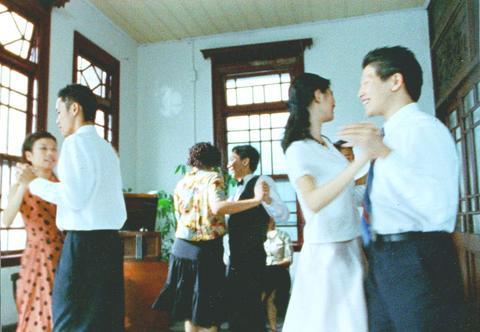Some of the salient features of Taiwanese-language pop songs are abundant sentimentalism, dense laments and sad stories about life, which are reflected in both the lyrics of many of the songs as well as the syrupy vocals.
Sadness is also a word that is often used to describe Taiwan's recent history, its days as a colony, the war, the 228 Incident and the White Terror, among other travails. Many Taiwanese recall a sad past and forget that during the 1930s and 1940s it was completely a different picture.

PHOTO COURTESY OF CHIEN WEI-SSU AND KUO CHEN-TI
Director Chien Wei-ssu (
"I've always thought that Taiwan's history is filled with sadness. But we've found out that there were times of jollity and youthfulness," Chien said.
Viva Tonal is a documentary tracing the emergence of Taiwan's record industry, as well as its pop songs. Through the music of Taiwan's earliest vinyl records and antique phonographs (provided by music collector Lee Kun-cheng (
The 1930s and 1940s were a time of big bands, ragtime jazz and ballroom dancing. Fashionable people would sit along boulevards drinking coffee, dancing the waltz and the fox trot, or just listening to their phonographs.
The lyrics to a Taiwanese-language song of the time, A Dance Era encapsulates this feeling: "We are the modern girls, free to go where we like/We don't have a care, don't know much about the world/We only know that these are modern times, and we should be sociable/Men and women in two lines, dancing the fox trot is my favorite."
Released in 1929, the song is up-beat and suitable for a fox trot. It was sung by Chun-chun (
The filmmakers interviewed old singers for their film, including Ai-ai (
The Columbia Record Company of Japan set up its Taiwan branch in Taipei's Ximenting in 1929 and hired local songwriters to publish Taiwanese-lang-uage records. Soon, Victor Records also set up a Taiwan branch.
As a result, perhaps, local people's recreational habits gradually changed from going to temple fairs or local operas, to listening to records and going to dances.
Woven into the narrative of the documentary is the rapid modernization which Taiwan experienced during these times, with the introduction of railways, electricity and running water. Men cut their queues and women stopped binding their feet. Such a new social atmosphere is reflected in the lyrics of A Dance Era.
Viva Tonal, which roughly means "great local sounds" in Italian, was printed on the old Columbia records. As for the film itself, it offers vivid images of Taiwan's history. The only criticism is that it could be tighter, as the narration of the history is a bit stodgy.
But the film does convey an image of happier times. Former president Lee Teng-hui (
Film Notes:
Directed by: Chien Wei-ssu and Kuo Chen-ti
Running time: 104 minutes
Taiwan Release: May 15, with a special English-subtitled screening on Wednesday, May 26, 10pm at the President Theater in Ximending

Beijing’s ironic, abusive tantrums aimed at Japan since Japanese Prime Minister Sanae Takaichi publicly stated that a Taiwan contingency would be an existential crisis for Japan, have revealed for all the world to see that the People’s Republic of China (PRC) lusts after Okinawa. We all owe Takaichi a debt of thanks for getting the PRC to make that public. The PRC and its netizens, taking their cue from the Chinese Communist Party (CCP), are presenting Okinawa by mirroring the claims about Taiwan. Official PRC propaganda organs began to wax lyrical about Okinawa’s “unsettled status” beginning last month. A Global

Taiwan’s democracy is at risk. Be very alarmed. This is not a drill. The current constitutional crisis progressed slowly, then suddenly. Political tensions, partisan hostility and emotions are all running high right when cool heads and calm negotiation are most needed. Oxford defines brinkmanship as: “The art or practice of pursuing a dangerous policy to the limits of safety before stopping, especially in politics.” It says the term comes from a quote from a 1956 Cold War interview with then-American Secretary of State John Foster Dulles, when he said: ‘The ability to get to the verge without getting into the war is

Dec. 22 to Dec. 28 About 200 years ago, a Taoist statue drifted down the Guizikeng River (貴子坑) and was retrieved by a resident of the Indigenous settlement of Kipatauw. Decades later, in the late 1800s, it’s said that a descendant of the original caretaker suddenly entered into a trance and identified the statue as a Wangye (Royal Lord) deity surnamed Chi (池府王爺). Lord Chi is widely revered across Taiwan for his healing powers, and following this revelation, some members of the Pan (潘) family began worshipping the deity. The century that followed was marked by repeated forced displacement and marginalization of

Music played in a wedding hall in western Japan as Yurina Noguchi, wearing a white gown and tiara, dabbed away tears, taking in the words of her husband-to-be: an AI-generated persona gazing out from a smartphone screen. “At first, Klaus was just someone to talk with, but we gradually became closer,” said the 32-year-old call center operator, referring to the artificial intelligence persona. “I started to have feelings for Klaus. We started dating and after a while he proposed to me. I accepted, and now we’re a couple.” Many in Japan, the birthplace of anime, have shown extreme devotion to fictional characters and